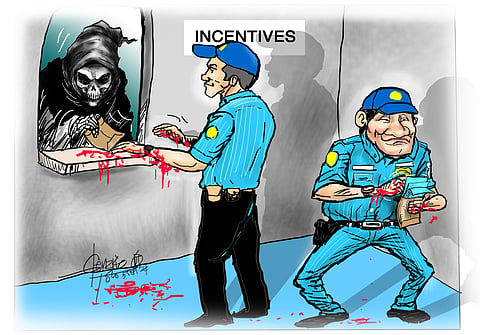
- NEWS
- the EDIT
- COMMENTARY
- BUSINESS
- LIFE
- SHOW
- ACTION
- GLOBAL GOALS
- SNAPS
- DYARYO TIRADA
- MORE

The Philippine National Police (PNP) recently announced plans to investigate allegations of a reward and quota system in the Duterte administration’s controversial “war on drugs.”
For many, this probe is long overdue — a reckoning of sorts, albeit one that comes after thousands of lives have been lost and entire communities have been left scarred by the brutality of the anti-drug campaign. Others may see it as a half-hearted attempt to appease critics of the administration, raising questions about whether this investigation will genuinely seek justice or merely serve as a political formality.
At the heart of these allegations is the notion that law enforcement officers were incentivized to meet certain “quotas” of drug arrests and even killings, with rewards allegedly offered for the most impressive body counts. If true, this would not only have institutionalized violence but also fostered a culture where human lives were reduced to mere statistics in the name of law and order. In such a system, success wasn’t measured by effective crime reduction or rehabilitation, but by how many people ended up dead or behind bars.
The very concept of a reward and quota system tied to human lives is chilling, a dystopian reality where police officers may have felt pressure to hit their numbers—sometimes at the cost of due process or even basic humanity. The result? A reported death toll ranging from official numbers of around 6,000 to the tens of thousands estimated by human rights organizations. Many of these victims were alleged small-time drug users and pushers, gunned down in police operations that, critics claim, were little more than state-sanctioned executions.
The fact that the PNP is now looking into these allegations raises serious concerns about the true motivations behind the drug war. Was this an anti-crime campaign with noble intentions gone horribly wrong? Or was it, as critics have suggested, a deliberate and systematic approach to eliminate a marginalized portion of the population under the guise of law enforcement? The allegations suggest that officers were driven not by justice, but by the desire to meet artificially set targets, knowing they would be rewarded for their “efforts.”
For years, the Duterte administration and its supporters painted the drug war as a necessary evil—a harsh but effective means of eradicating the country’s drug problem. Critics were dismissed as bleeding-heart liberals who didn’t understand the “real” situation on the ground, while the international community’s condemnation was often met with defensive nationalism. But now, with the PNP stepping forward to investigate, it seems there may finally be some acknowledgment, however belated, that the war on drugs was far from the righteous campaign it was often portrayed to be.
However, this investigation comes with its own set of problems. For one, the PNP is being tasked with investigating itself. While the police leadership may claim that this will be an independent and thorough investigation, the reality is that it is difficult to be impartial when the institution’s own reputation and integrity are at stake. There’s also the possibility that this probe may be used to scapegoat lower-ranking officers, laying the blame on “bad apples” while shielding higher-ups who may have been complicit or even responsible for setting these deadly targets.
The war on drugs left deep scars on the fabric of Philippine society, with communities devastated by the loss of breadwinners, parents, siblings, and children. Fear and mistrust of law enforcement grew, particularly in poorer neighborhoods, where police raids often ended in death instead of rehabilitation. The alleged existence of a reward and quota system only exacerbated this distrust, suggesting that the people tasked with protecting society were instead motivated by personal gain and professional advancement.
This investigation, if it is to mean anything, must go beyond just collecting facts and pointing fingers. It must be a first step toward healing a nation that has been profoundly divided by the violence of the drug war.
